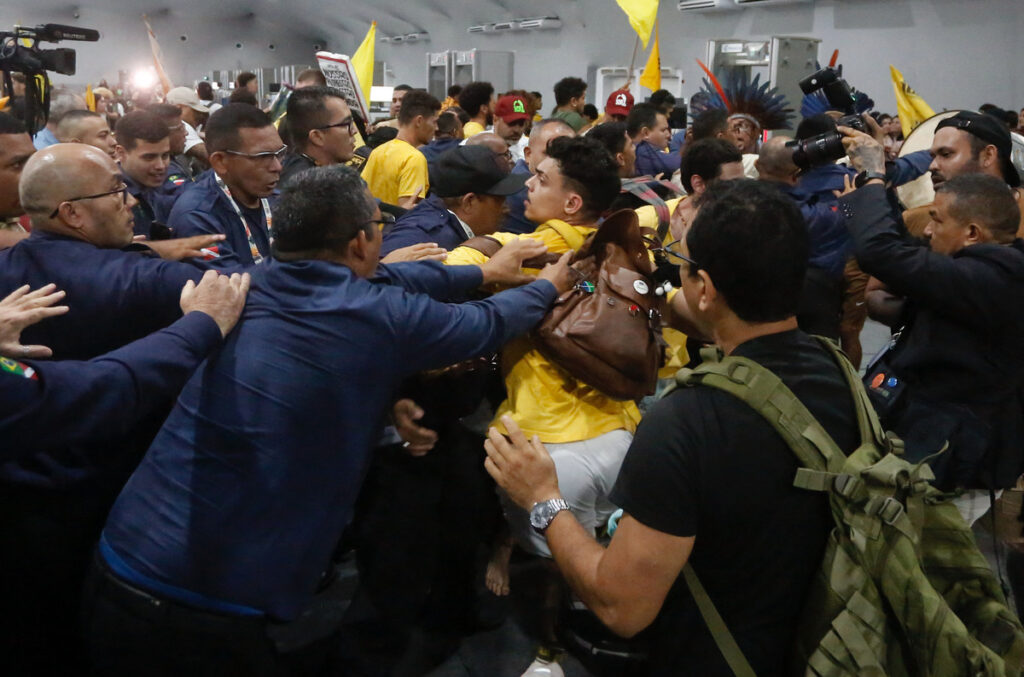
At the 30th annual 2025 United Nations Climate Change Conference (COP30) in Belém, Brazil, tensions flared dramatically as protesters—many from Indigenous communities—clashed with U.N. security personnel in what became one of the most visible disruptions at a major climate summit in recent years. politico.com+2Reuters+2
The Incident
Late on Tuesday, November 11 2025, demonstrators carrying yellow flags and banners marched toward the summit’s entrance, demanding accountability and action on oil drilling in the Amazon region. According to reporters, around 7 : 30 p.m. local time, the group attempted to breach the entrance of the summit venue. Security personnel responded by erecting barricades—tables and other barriers—and physically engaging protesters to prevent further incursion. Reuters+2Reuters+2
Footage from the scene shows protesters wearing traditional Indigenous attire and waving slogans such as “Our land is not for sale” and “We can’t eat money.” bdnews24.com+2The Guardian+2 In the confronting melee, at least two U.N. security guards sustained minor injuries. Videos also depict scuffles, pushing, and the use of makeshift barricades as the security team regained control. Anadolu Ajansı+2politico.com+2
Underlying Grievances
What triggered the escalation goes beyond the immediate clash. Many of the protesters were Indigenous and community members from the Amazon region who are frustrated by what they perceive as exclusion from decision-making processes and ongoing threats to their lands from oil exploration, logging, mining, and agribusiness. Aaj English TV
One Indigenous leader from the Tupinambá community, who gave only the name Gilmar, declared:

“We can’t eat money… We want our lands free from agribusiness, oil exploration, illegal miners and illegal loggers.” The Business Standard+1
Although this COP is hosted in Brazil in the heart of the Amazon, and the Brazilian government has highlighted Indigenous participation, these protesters argue that words have yet to translate into meaningful policy changes. Al Jazeera+1
Why It Matters
This incident is significant for a number of reasons:
- Symbolic Location: The Amazon region is one of the most climate-critical ecosystems on Earth—hosting vast carbon stocks and biodiversity. A protest here sends a strong message about forest preservation and Indigenous rights.
- Tensions Over Fossil Fuel Expansion: The demonstration centered explicitly on oil drilling and fossil fuel development in a region already facing environmental stress. The contrast between a climate summit and the expansion of fossil fuel projects compounds the frustration.
- Representation and Justice: Indigenous voices argue that the very communities most affected by climate change are still marginalized in policy arenas. The clash reflects deeper structural issues: who gets heard, and who is left behind?
- Security and Summit Atmosphere: A physical confrontation disrupts the expected decorum of a summit yet underscores the urgency and stakes behind climate negotiations.
What Happens Next
Despite the disruption, summit organizers declare that negotiations have resumed and that the venue is secured. Reuters+1 However, the incident amplifies calls for the summit to not only produce new pledges and targets, but also to deliver justice for Indigenous and local communities whose lands and lives are at stake.
Delegates, negotiators, and civil-society observers will now face added pressure: can COP30 move beyond diplomacy and rhetoric, and ensure that key voices are included, questions of fossil-fuel extraction are addressed, and actual accountability is built into outcomes?
What Readers Should Know
- Participating in climate action isn’t only about emissions targets—it’s about equity, justice, and the rights of people on the frontlines.
- Physical protests at diplomatic venues signal frustration that existing processes may be failing Indigenous communities and forest regions.
- The expansion of oil drilling and extractive industries in sensitive areas like the Amazon undermines international climate commitments and adds credibility to calls for deeper systemic change.
- Summits like COP30 can attract symbolic attention: hosting in the Amazon shines light on forests, but it also raises scrutiny when local communities feel sidelined.
For a broader look at how climate events, protests, and extractive-industry conflicts intersect with grassroots activism and community land rights, visit Sustainable Action Now’s Climate category.
Recent COP30 protest coverage

Protesters force their way into COP30 summit venue, clash with security

Brazil’s COP30 resumes day after security clashes with Indigenous protesters

Tussles break out between protesters and security at Cop30 in Brazil


